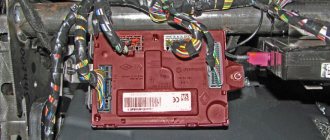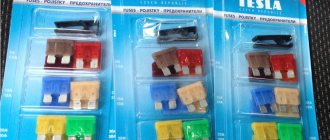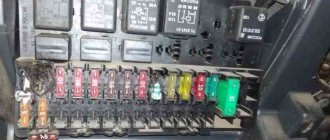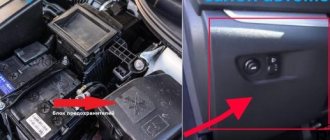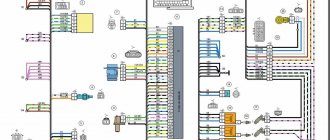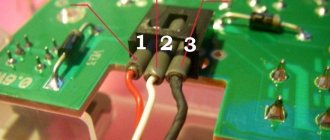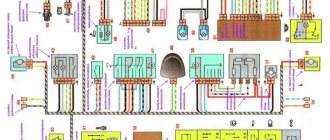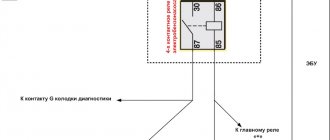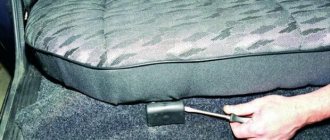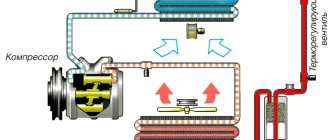The Lada Granta cooling fan is constantly running, what should I do?
Car : Lada Granta. Asks : Igor.
Hi all. This is my first breakdown, or maybe not a breakdown, I don’t know. I want to ask you. As soon as I start the car engine, the cooling fan immediately turns on. Even on a cold engine. I think this is not ok.
Yesterday I came home, the engine temperature on the instrument panel shows 80, and the fan is spinning. What is the operating temperature of the engine on the Grant, is it really 80 degrees?
I had something similar to the VAZ-2115. There the fan turned on while driving and did not turn off. But I had a State on-board computer, and there was a “reset ECU” item. After pressing this button, the speed twitched, then leveled off, and the cooling fan turned off.
At what temperature does the fan on the Priora turn on: important features of the thermal regime
New generation Lada
The engine of any car, including the Lada Priora, is a rather complex unit consisting of various mechanisms and systems. The stable operation of the engine is influenced by many factors, including temperature.
If the thermal conditions of the power unit are insufficient, this will affect the quality of formation of the fuel mixture in the cylinders. And when the thermal conditions are higher than required, this can lead to jamming of the cylinder-piston group, serious damage and lengthy and expensive repairs.
The principle of operation of the cooling system
The main task of the cooling system is to ensure optimal temperature conditions for the Priora engine. The vehicle is equipped with a system with forced circulation of coolant. Its main element is the cooling jacket through which the liquid circulates.
To maintain the integrity of the shirt, you should constantly monitor:
- quantity
- quality of the liquid (for example, Antifreeze).
If its amount is too low, the system will not be able to properly maintain the thermal regime of the power plant, and it will overheat. Antifreeze heavily diluted with water will not have adequate frost resistance, and in winter the shirt may freeze.
Another important element of the system is the liquid pump. The purpose of the pump is to ensure the circulation of Antifreeze throughout the system. The Priora pump is belt driven from the crankshaft. The condition of the pump also needs to be constantly monitored. If the bearing in it starts to fail, it will jam. The result of wedging will be:
- inability to maintain optimal temperature;
- the likelihood of a timing belt break.
Priora engine
This, in turn, will damage the gas distribution mechanism.
Until the engine reaches the desired temperature, the liquid circulates in a small circle, that is, it moves only along the jacket. When the temperature approaches normal, the liquid will begin to move in a large circle. In addition to the cooling jacket, it also includes a radiator with a fan installed on it. The cooler starts working only when the liquid temperature begins to exceed the permissible limit. For monitoring, a temperature sensor is built into the cooling jacket, also known as a fan switch on sensor.
The thermostat is responsible for which circle the Tosol moves in. Incorrect operation of the thermostat or its jamming will either lead to overheating of the unit or to the fact that it will not be able to reach the optimal thermal conditions.
This system works on a Priora like this: while the power plant is cold, the thermostat is in a position that blocks the channel going to the radiator. The liquid, thanks to the pump, circulates through the cooling jacket. As it warms up, the thermostat begins to open the channel slightly, and liquid begins to flow into the radiator to reduce the temperature of the liquid itself.
In the summer, when idling in a traffic jam, the air flow passing through the radiator is insufficient, and the temperature continues to rise. The fan switch-on sensor monitors this indicator, and if it begins to exceed the permissible limit, it turns on forced cooling of the radiator, which additionally creates an air flow to ensure cooling of the Antifreeze.
Cooling system malfunctions
Cooling system diagram
The system is structurally simple, but it needs to be constantly monitored. First you need to know what the operating temperature of the engine of the Lada Priora is. For this car it is 90˚С. The engine temperature is displayed on a sensor located on the dashboard. While driving, you should constantly monitor its readings. If they exceed 100˚C, you should pay attention to whether the fan turns on.
The problem when the fan does not turn on on the Priora may be hidden within itself, or the cause of overheating may be the fan switch on sensor.
If it is found that the fan does not turn on when the permissible temperature is exceeded, first of all you should check the connection of the wires to it. It often happens that one of the terminals falls off, which is why the fan does not turn on.
If the wiring is in order, it is worth checking its operation and finding out whether the fan switch is activated. To do this, you need to start the power unit and disconnect the wires from the temperature sensor installed on the engine. When the wires are disconnected, the forced cooling should start working; if this does not happen, there is most likely a problem with the drive motor.
If, when the wires are disconnected, it starts to work, the fan switch sensor has probably failed. It is quite possible that it incorrectly perceives information about the temperature of the power unit and therefore does not turn on. This problem is solved by replacing the fan switch sensor.
After the sensor is replaced, you should again check whether forced cooling of the radiator turns on and at what temperature this occurs. To do this, you need to start the engine and set the speed to medium. When the optimal thermal mode is reached, you need to continue to hold the speed until the temperature rises and it turns on. If the operation occurs at a value of 97-100˚C, we can assume that the cooling system on the Priora is working properly.
Thermostat malfunction
https://www..com/watch?v=yP5t75i68FI
You should also keep an eye on the thermostat.
If it does not work as expected, the power unit will not be able to establish the optimal warm mode. To check the functionality of the thermostat, you need to proceed as follows: 1[/td]
| № | Action |
| Start the engine. | |
| 2 | You should place your palm on the pipe that goes from it to the radiator. |
| 3 | Until the engine reaches optimal operating conditions, the pipe must be cold, since antifreeze does not circulate in a large circle. |
| 4 | Only when the desired thermal conditions are achieved should the pipe become warm. |
If the pipe heats up much earlier, most likely the thermostat is stuck in the position where the Antifreeze is circulating in a large circle. The thermostat is an element that cannot be repaired; it is simply replaced.
Loading …
Source: https://1ladapriora.ru/modifikacii/temperatura-dvigatelya-rabochaya.html
Headings Work
Where are the fuses for the Lada Granta?
The fuse box is located near the driver's left foot. To open the lid, pull the lower left corner of the lid (No. 1) and release the left locking point, then the middle one (No. 2) and the two right locking points (No. 3 and 6). Then release the top points (No. 4 and 5) and remove the cover.
Installing the mounting block cover is done in the following order: first snap the right side of the cover, then the lower ones, and then the upper ones. Make sure that the fastening elements of the cover are aligned exactly with the metal fasteners.
There are symbols on the plastic cover of the mounting block that indicate what each fuse (F) and relay (K) does.
Fuse layout diagram in the mounting block
Fuse box in the passenger compartment
To get to the main mounting block, you need to pull the cover from the lower left corner, and then continue to unlock it one by one until the lower right end of the cover. Then move to the upper corners, releasing which you can remove the cover. Returning it to its place is done in the reverse order.
| Name | Power, A | What is he responsible for? |
| F1 | 15 | Ignition coils, injectors and engine controller |
| F2 (Lux and Normal) | 25 | Central electronics unit and driver's doors |
| F2 (Standard) | 5 | Daytime running lights |
| F2 | 30 | Window lifters |
| F3 (Norma and Lux) | 15 | Automatic transmission controller and drive |
| F3 (Standard) | 10 | Emergency crew |
| F4 | 15 | Airbag controller |
| F5 | 7,5 | Terminal 15 devices |
| F6 | 7,5 | Rear light and turn signals (Standard) or automatic transmission controller, safe parking (Norma and Lux) |
| F7 | 7,5 | Mass air flow sensor and pressure sensor, phase sensor, oxygen concentration sensors, canister purge valve |
| F8 | 25 | Rear window heater, outside mirror heaters (Norma and Lux) |
| F9 | 5 | Right side lights |
| F10 | 5 | Left side lights, interior and license plate lighting, trunk and glove box lighting |
| F11 | 5 | Rear fog lights |
| F12 | 7,5 | Right low beam and its electric corrector |
| F13 | 7,5 | Left neighbor and his electrical corrector |
| F14 | 10 | Right high beam |
| F15 | 10 | Left high beam |
| F16 | 10 | Right fog light |
| F17 | 10 | Left fog light |
| F18 | 20 | Cigarette lighter and front seat heaters |
| F18 | 10 | Cigarette lighter |
| F18 | 15 | Front seat heaters |
| F19 (Norma and Lux) | 5 | Anti-lock brake |
| F19 (Standard) | 20 | Door lock motors |
| F19 | 15 | ABS |
| F20 | 15 | Sound signal |
| F20 | 15 | Horn, trunk lock, gearbox, diagnostic connector and cigarette lighter |
| F21 | 10 | Gasoline pump |
| F22 | 25 | Central electronics unit, front and rear windshield washers, rear wiper |
| F22 | 15 | central locking |
| F23 | 5 | Instrument cluster and diagnostic connector |
| F23 | 7,5 | Daytime running lights |
| F24 (Norma and Lux) | 7,5 | Climate Controller and A/C Compressor Clutch |
| F25 | 10 | Braking, interior lighting (Standard) |
| F26 (Norma and Lux) | 25 | Central electronic unit |
| F26 | 25 | ABS/ESC |
| F27/F31 | 30 | Anti-lock brake unit |
| F28/F32 | Heating electric fan, climate control controller, electric power steering |
Fuse box in the engine compartment
| Name | Power, A | What is he responsible for? |
| F1 | 50 | Front window defroster |
| F1 | 30 | Low headlights |
| F2 | 60 | Generator |
| F3 | 60 | Generator |
| F4 | 30/40 | Radiator cooling fan |
| F5 | 50 | Electric power steering |
| F6 | 40 | Anti-lock brakes |
New mounting block
| Name | Power, A | What is he responsible for? |
| F1 | 15 | Ignition coils, injectors and engine controller, cooling fan relay |
| F2 | 30 | Luxury: Central body electronics unit Norm and standard: Reserve |
| F3 | 10 | Luxury: Body electronics central unit Light switch |
| F3 | 15 | Alarm |
| F4 | 15 | Luxury: Airbag Controller Rain Sensor |
| F4 | 20 | Windshield washer Windshield wiper Airbag controller |
| F5 | 7,5 | Terminal 15 devices |
| F6 | 7,5 | Rear Light Control Parking System (Luxury) |
| F7 | 7,5 | Mass air flow sensor and pressure sensor, phase sensor, oxygen concentration sensors, canister purge valve |
| F8 | — | Reserve |
| F9 | 5 | Right side lights |
| F10 | 5 | Left side headlights, instrument and license plate lighting, trunk and glove compartment lighting |
| F11 | 5 | Rear fog lights |
| F12 | 10 | Right low beam |
| F13 | 10 | Left low beam |
| F14 | 15 | Cartridge for connecting additional devices in the trunk |
| F15 | 10 | Rear window cleaner and washer |
| F16 | 5 | Lux: Driver door module Norm and Standard: Reserve |
| F17 | — | Reserve |
| F18 | — | Reserve |
| F19 | — | Reserve |
| F20 | — | Reserve |
| F21 | 10 | Right high beam |
| F22 | 10 | Left high beam |
| F23 | 10 | Right fog light |
| F24 | 10 | Left fog light |
| F25 | 15 | Heated front seats |
| F26 | 5 | Anti-lock brakes and directional stability |
| F27 | 15 | Cigarette lighter |
| F28 | 15 | Gasoline pump |
| F29 | 20 | Luxury: Central body electronics unit Windshield wiper and washer |
| F29 | 15 | Norm and Standard: Gearmotors for door locks Gearmotors for locking trunk locks |
| F30 | 10 | Norm and Standard: Daytime running lights |
| F31 | 7,5 | A/C compressor clutch |
| F32 | 7,5 | Brake signal Automatic transmission controller Interior lighting (Normal and Standard) |
| F32 | 30 | Heater |
| F33 | 25 | Anti-lock brake system control unit Stability control unit |
| F34 | 5 | Instrument cluster Diagnostic connector |
| F35 | 15 | Norm and Standard: Airbag control Lux: Reserve |
| F36 | 10 | Sound signal |
| F37 | 10 | Multimedia system |
| F38 | — | Reserve |
| F39 | — | reserve |
| F40 | — | Reserve |
| F41 | 50 | Heated windshield |
| F42 | 30 | Norm and Standard: Power windows for front doors Luxury: Reserve |
| F43 | 50 | Robotic gearbox controller |
| F44 | 30 | Electric heater fan Climate control controller |
| F45 | 25 | Heated rear window and exterior mirrors |
| F46 | — | Reserve |
| New type block relay | ||
| K1 | 50 | Ignition switch unloading relay |
| K2 | 30 | Starter |
| K3 | 40 | Luxury: Electric radiator cooling fan |
| K3 | 30 | Norm and Standard: Windshield wipers |
| K4 | 30 | Electric radiator cooling fan |
| K5 | 30 | Luxury: A/C Compressor Clutch |
| K5 | 30 | Norm and Standard: Direction and hazard indicators |
| K6 | 30 | Luxury: Heated rear window and outside mirrors |
| K6 | 30 | Norm and Standard: Front electric windows |
| K7 | 20 | High beam |
| K8 | 20 | Sound signal |
| K9 | 20 | Low beam |
| K10 | 20 | Reversing light |
| K11 | 20 | ECM main relay |
| K12 | 20 | Fuel pump |
| K13 | 20 | Seat heating |
| K14 | 70 | Heated windshield |
| K15 | 30 | Norm and Standard: Heated rear window and exterior mirrors Luxury: Reserve |
| K16 | 30 | Norm and Standard: Air conditioning compressor clutch Lux: Reserve |
| K17 | — | Reserve |
| K18 | 40 | Norm and Standard: Electric radiator cooling fan Luxury: Reserve |
Fuse and relay diagram
| Fuse | Current strength, A | Protected circuit |
| F1 | 15 | — Relay for turning on the engine cooling fan — Short circuit 2x2 — Controller (engine control unit) — Injectors — Ignition coil |
| F2 | 30 | Electric windows |
| F3 | 15 | Alarm |
| F4 | 20 | — Windshield wiper — Airbag |
| F5 | 7,5 | Ignition switch terminal 15 |
| F6 | 7,5 | Reversing light |
| F7 | 7,5 | — Canister valve — Mass air flow sensor — Oxygen sensor 1/2 — Speed sensor |
| F8 | 30 | Rear window defroster circuit |
| F9 | 5 | Side lights on starboard side |
| F10 | 5 | Side lights on the left side |
| F11 | 5 | Rear fog lights |
| F12 | 7,5 | Low beam on starboard side |
| F13 | 7,5 | Low beam on the left side |
| F14 | 10 | High beam on starboard side |
| F15 | 10 | High beam on the left side |
| F16 | 10 | Front fog lamp on starboard side |
| F17 | 10 | Front fog lamp on the left side |
| F18 | 15 | Heated front seats |
| F19 | 10 | ABS (Anti-lock Braking System) |
| F20 | 15 | — Horn — Trunk lock — Transmission — Cigarette lighter — Diagnostic connector |
| F21 | 15 | Electric fuel pump |
| F22 | 15 | central locking |
| F23 | 10 | Daytime Running Lights |
| F24 | 7,5 | Air conditioner |
| F25 | 10 | — Interior lighting — Brake light |
| F26 | 25 | Anti-lock braking system |
| F27 | — | Spare |
| F28 | — | Spare |
| F29 | — | Spare |
| F30 | — | Spare |
| F31 | 50 | Heated windshield |
| F32 | 30 | — Heater — Electric power steering |
| Relay | Description |
| K1 | Heater fan relay. |
| K2 | Power window relay |
| K3 | Starter relay |
| K4 | Ignition switch terminal 15 relay |
| K5 | Turn signal and hazard warning relay |
| K6 | Wiper relay |
| K7 | High beam relay |
| K8 | Horn relay |
| K9 | Low beam relay |
| K10 | Heated rear window relay |
| K11 | Controller relay (engine control unit) |
| K12 | Electric fuel pump relay |
The fan runs on a cold motor: causes, diagnosis, repair
Let's start with the fact that this problem can clearly indicate both a malfunction of the liquid cooling system and a malfunction of the fan itself. In any case, we are talking about a breakdown that cannot be ignored, since the risk of overheating of the internal combustion engine significantly increases.
For a better understanding, it is necessary to superficially consider the principle of operation of the fan on most modern cars. The airflow is activated by a special sensor located at the bottom of the radiator. Also, many cars use a separate engine cooling fan control unit. There are also models in which the ECU itself is responsible for turning on the fan, but this design is rarely used.
As you can see, the fan should not work on a cold engine. So, to determine why the fan turns on early, for injection cars with an OBD II diagnostic connector, it is recommended to start with computer diagnostics of the car. The fact is that the ability to read error codes from the ECU allows you to more accurately determine the cause of the malfunction.
We also note that in cases where the control unit detects errors in the cooling system, the fan can spin immediately after turning on the ignition, even on a cold internal combustion engine. This feature is found only on some models and is, in fact, protection against overheating of the power unit, since a constantly running fan reduces the temperature.
After repair, in this case you will also need to reset the errors. To erase an error from the ECU, on some models it is enough to remove the terminal from the battery for a couple of minutes, while on others the reset is carried out using diagnostic equipment.
Common cooling fan problems
Now let's look at common problems that are associated with the cooling system and the fan itself.
- First of all, in many cases the contacts of the air system sensor short-circuit. In this case, the air blower is activated immediately after the ignition is turned on.
During the diagnostic process, the resistance at the outputs is measured on a cold sensor using a multimeter. Deviations from the norm will indicate the need to replace the element.
- There is not enough coolant in the liquid system. In this case, the fan is triggered due to the fact that a small amount of antifreeze or antifreeze heats up very quickly. In other words, the fan is working properly and starts naturally.
As a rule, leaks or decreased coolant levels in the expansion tank are the main cause. Please note that antifreeze is a mixture of concentrate and water. Water gradually evaporates from the system, causing the level to drop. For this reason, it is recommended to periodically check and add fluid according to special marks.
- The fan shorts to ground because the wire may not be screwed securely enough, the contact point has been damaged, etc.
In this case, the fan can short-circuit to the battery and run non-stop. In such a situation, you need to check all contacts, wiring and other elements. Wires must be securely insulated and properly connected.
- The fan sensor, which is integrated into the thermostat housing, has failed. Quite a lot of modern cars are designed with a thermostat, which is combined with a fan control sensor.
This solution allows for flexible control of the engine cooling system. However, if there is a problem with the temperature sensor in the thermostat housing, the fan may start running without turning off. The fact is that the control unit begins to receive incorrect signals about how the thermostat works. As a result, the emergency mode is activated, the fan turns on and runs constantly.
In such a situation, you need to check the sensor with a multimeter. Normally, on a cold engine its resistance is infinite, in other cases the indicator should be 100 - 500 Ohms. Deviations in the readings from the norm will indicate that the sensor needs to be replaced with a new one or a known good one.
- The outside air temperature sensor has failed. This problem occurs on some cars that are equipped with ambient temperature sensors. If the temperature is above the permissible limit, then these sensors will turn on the fan.
This solution allows for more efficient cooling of the power unit, especially on cars that have a powerful forced-internal combustion engine and several radiators. On such units, the fan can be turned on in the warm season even on a cold internal combustion engine to protect against engine overheating.
- After turning on the car air conditioner, the fan is constantly running. Note that on some models this fan operation is normal.
To solve the problem, external cleaning of the air conditioner radiator and cooling system radiator may be required. The fact is that these radiators are located next to each other, dirt, dust and fluff accumulate between them. Removing such a “coat” allows you to normalize the operation of the air conditioning and engine cooling system, get rid of frequent fan starts and increased noise during its operation.
- Problems with wiring and electrical contacts. Regardless of how the fan is controlled, contacts are a common cause of problems.
In order to avoid such a situation, experienced drivers recommend cleaning contacts before the onset of winter and summer for preventive purposes. Treatment with special lubricants and protective compounds is also actively practiced.
Good day! I recently purchased an Astra, and immediately had a stupid question: the engine cooling fan turns on at 108 degrees, isn’t it too much?
105-108. If it's higher, something is wrong. XER high temperature engines (95-105 is their normal operating temperature)
and on Z16XEP? I turn it on at 113.
I think the same. In general, the operating principle is such that the cycle 102-105(8) should be endless. That is, at a temperature of 102 degrees, the thermostat opens completely, then if the temperature does not drop, the fan turns on, bringing the temperature down to 100-102, the temperature rises and everything starts again. temperature 113 if you didn’t stand in a traffic jam for an hour at plus 30 - it shouldn’t be. There may be a problem with the thermostat. This is the aster's weak point. see if there are any errors.
Likewise! And at 108 it turns off.
That's it. Only in traffic jams. On the highway - 100-102, and just in normal traffic.
Astra H, 2007, Z16XEP, handle, Germany - sold 04.2013. Astra J GTC, 2012, A18XER, 5 manual transmission
Kyper
, you're fine. That's how the software is written on FUCK.
udow
, +1. The same song, year of release 2004.
Kyper
, you're fine. That's how the software is written on FUCK.
udow
, +1. The same song, year of release 2004.
Yes, I already read it, it’s not 113, but at 112 it should be switched on and there doesn’t seem to be a 1st speed. no errors
But if, on the contrary, it turns on at too low a temperature, I noticed that my fan turns on even at 50 degrees, what could this mean?
That the air conditioner is on. The fan cools not only the engine radiator, but also the air conditioner condenser, but the activation there is determined not by temperature, but by refrigerant pressure.
And mine is 101 gr. turns on. Motor 14XER. And at 95 it turns off. But now summer has come and how often it turns on. I can't figure out if it's a problem or not.
YuriFirst
check the radiators for cloggedness, most likely it won't hurt to flush them
I changed the soap and antifreeze just in case.
I support that on xep the fan switching temperature is 113 degrees, no matter where, how, or how long the engine runs, this is its norm!
How many speeds does the fan have and at what temperature does it turn on?
The fan has 2 speeds. 1st for climate, it can turn on even when the engine is not warmed up if the climate in the cabin is set below the ambient temperature. and the second speed usually turns on when the peak temperature is reached, depending on the engine, for me personally it turns on at 113 and turns off at 107. And the 2nd speed is turned on for the climate when it’s so hot outside!
tell. Errors are generated by P0480 P0481. Carlson turns on when the liquid temperature is 93-95 and extinguishes until 90. is this normal? z18kher engine How to fix. fuse ok I cleared the errors by the opkom, but when Carlson started buzzing again, the check light came on
Topic information
Video description
Attention!
The relay and fuse diagram may differ depending on the configuration and production date of the vehicle. Current diagrams of the mounting block are presented in the operating manual for the date of manufacture of the vehicle (download from the official website).
Let us remind you that you will find other useful instructions in the section Repair and operation of the Lada Granta.
Most electrical circuits in modern cars are protected by fuses. Firstly, this protects the electrical device itself from damage, and secondly, it prevents the threat of fire due to overheating or short circuit.
Radiator fan problems: causes, solutions
The task of the cooling system fan is to reduce the temperature of the engine and radiator, which increases when the engine is running. In effect, it directs hot air outside, replacing it with cool “outside” air, thereby reducing the temperature of the engine, radiator and coolant.
It should be noted that the fan is one of two important elements of the cooling system (by the way, it is considered a hybrid in VAZ cars). The second element is the liquid cooling system.
There are two types of fans - mechanical (attached by a belt to a pulley/crankshaft) and electrically driven. The latter consists of two equivalent parts - an electric motor and a control system (including a coolant temperature sensor and a fan relay). As a rule, VAZ users deal with electric fans.
Problems with the radiator cooling fan can occur in any car whose age is significant enough to manifest itself as “senile ailments.” These problems, depending on the situation, may manifest themselves in unstable operation of the fan, its delayed switching on, or complete failure. In the latter case, the cooling fan simply does not turn on - and this is the most common problem.
VAZ cooling fan does not turn on
Since this problem is the most common, it needs the most attention. And first of all, it should be noted that this problem can be caused by a significant number of reasons, and therefore the most costly (at least in terms of time) stage will be diagnosis.
The reason why the 2110 cooling fan does not turn on, as well as almost any other model produced by AvtoVAZ, may be, for example, due to a blown fuse. This is the most common cause of fan failure, and the easiest in terms of correcting the problem.
For the same reason, the cooling fan of the VAZ 2115 and other later models of VAZ cars often does not turn on. To eliminate this malfunction, it is enough to replace the faulty fuse with a working one - and the problem is eliminated.
You can replace either one fuse (if you have already figured out the circuit or you have time for this) or the fuse block as a whole. If the car is many years old, the second option is preferable.
Another reason why the Kalina or Priora cooling fan does not turn on may be a malfunction of some element of your car’s electrical network. In this case, at least for inexperienced craftsmen, it will be much easier and faster to turn to professionals for help, since even diagnostics will require a lot of effort - and the use of special diagnostic equipment (to “ring” the electrical wiring).
In addition, if the cooling fan does not turn on, the reasons can also be found in the thermostat - if the latter is faulty, then the system may simply not respond to the need to connect the cooling system. A failed or jammed thermostat blocks the circulation of coolant in the system (including through the radiator), the radiator sensor does not detect elevated coolant temperatures, the fan does not turn on - and the engine “boils” after just a few minutes of operation. It is recommended to check the thermostat first if you notice a fan failure.
The user manuals state that the 2107 cooling fan does not turn on, often due to faulty wiring. Indeed, this reason may exist, but it is not among the top three in frequency. Typically, problems arise in situations where the fan wiring has not been changed for many years. Rotten wiring is not just a reason for fan failure, but also a possible cause of much more serious malfunctions and even fires, so control in this area is absolutely necessary.
In many sources you can find information that the cooling fan 2114 does not turn on, for example, for a trivial reason - the fan itself is faulty. This is relatively rare, but may be the cause of the problem. Both the fan itself and the plug can fail (the latter is more common, and relates rather to the previous point).
The fan switch sensor (located on the radiator) may also be faulty - and this leads to blocking the fan. Identification of a faulty unit is carried out by sequentially checking the performance of individual elements of the system. By excluding one or another element, we connect the wiring directly: if we see a spark or the fan itself gives signs of life, it means that the “weak link” is precisely the excluded element.
Another reason why the cooling fan does not turn on in 2109, 2107, 2114 and other VAZ models. It's a blown head gasket. In this case, the movement of the coolant is impeded by an air lock, which can be easily diagnosed by bubbles appearing from the expansion tank while the engine is running. By replacing the gasket, you can easily solve this problem. However, it is important to pay attention to the condition of the cylinder - with such a problem (especially if it appeared some time ago), cracks may well appear in the cylinder.
Cooling fan turns on too often
This problem occurs relatively rarely, and here you need to very clearly understand where the norm is and where the system should be diagnosed. Novice motorists, having read in the user manual that the fan is “supposed” to turn on only at a temperature of 105 degrees, are worried because the cooling system turns on at a lower temperature.
In fact, everything is somewhat different. A temperature of 85-95 degrees should be considered the norm; the cooling system should operate above that, otherwise there is a high risk of the engine “boiling.” However, a lot depends on the driving conditions - it’s one thing on the highway, and another in the city, and especially when driving in a traffic jam. If in traffic jams the fan turns on every minute and a half, this indicates that the system is working well, because the engine operates at increased loads at 10-15 kilometers per hour, and even in the “walking and stopping” mode. Accordingly, turning on the fan indicates its serviceability.
Just in case, it is better to check the thermostat for operability and the integrity of the cylinder head gasket.
In addition, you can check the coolant consumption - if the coolant “leaves” too quickly (for example, less than a month passes from full load to minimum), you need to check for leaks as soon as possible. And, most likely, such will be discovered.
A decrease in the efficiency of the cooling system can also occur due to banal blockages (deposits) and technical side effects (air lock). In the first case, it is recommended to wash the radiator with a regular cleaning agent. As for the airlock, you can either try to “squeeze” it out at high speed, but this is fraught with problems with the traffic police, and in a particularly advanced case, a fatal accident. The usual “pumping” in the garage will be much more productive. Moreover, there are a lot of instructions for eliminating an airlock.
Good luck on the roads to you and your VAZ!
Also read with this article:
Source: https://videovaz.ru/vaz-2101/1780-problemy-s-ventilyatorom-radiatora-prichiny-puti-resheniya
Changing the lamp
So, we have the following task: Lada Granta turn signals do not work. The first step is to check whether the lamp has burned out. Let's say it burned out. This means it needs to be replaced. The front turn signals are equipped with PY21W lamps; you can purchase a new lamp and replace it yourself.
In order to pull out the lamp, you need to press on the socket and turn it. The direction of rotation depends on which side the headlight is located on. If on the right, then turn it clockwise. On the left - against, of course. Next, it should be pulled out of the cartridge. To do this, press the lamp and turn it counterclockwise all the way. Now you can insert a new lamp and return everything as it was.
A W5W lamp is installed in the side turn signal. How to get it? Let's say you are on the right wing. In this case, you need to move the turn signal housing to the right (correspondingly, the left one - to the left) and remove the indicator. The lamp socket rotates counterclockwise. Having taken out the lamp, you can replace it and put everything back together, after inspecting the rubber gasket. If you are not satisfied with it, this is a good time to replace it.
Relay block for VAZ - Lada Granta
This video shows where the relay
on the VAZ
okay grant
, and also shows how and where to find the right one...
Turn signals and emergency lights do not work on Grant//relay replacement
Relay clicks
? Then watch carefully, I’ll tell you how to get rid of it in literally 10 minutes. Well, as a...
Everything is fine with the lamp, but the turn signals on Grant still don’t work? Let's move on.
Replacing the Priora fan motor
To complete the work you will need tools: a 10" wrench, a flat-head screwdriver. The process of removing and installing an element consists of the following activities:
- As usual, before starting electrical work, disconnect the negative terminal from the battery.
- To ensure that nothing interferes with the process, remove the air filter.
- Now you need to find and disconnect the contact chip (connector) from the electric fan.
- On the left side, use a wrench to remove the two casing bolts.
- Unscrew the two nuts from the bottom and top.
- Carefully dismantle the assembly.
- Install a new, working device in the reverse order of the removal process.
Conclusion Now, in most situations when the Priora cooling fan does not work, you can identify the causes of the problems, and, if necessary, fix them yourself.
Source
Common causes of fuse failures
- Natural factor - due to long-term operation of the technical device;
- Mechanical damage, accident, impact, collision;
- Short circuit in the circuit;
- Damage to insulation, oxidation of terminals, loosening of contacts;
- Water entering the mounting block, condensation formation, deformation due to high operating temperature.
Fuse box under the hood of a car
In the Lada Granta car there is another block of “powerful” fuses under the hood of the car. The fuse rating is from 30A to 60A, which is why this unit is called a power unit.
The fuse box is indicated by an arrow
To access the fuses, pull the protective cover upward. It can be easily removed. After finishing work, do not forget to return the cover to its place.
Block diagram in configurations: Standard, Norma
| Fuse no. | Denomination, A | Description |
| F1 | 30 | Low beam headlights or main relay, circuits protected by fuses F1 and F21 of the mounting block in the passenger compartment |
| F2 | 60 | Generator |
| F3 | 60 | Generator |
| F4 | 30 | Heater fan (heater fuse grants) |
| F5 | 50 | Electric power steering |
Block diagram in the Lux configuration
| Fuse no. | Denomination | Description |
| F1 | 50A | Heated windshield |
| F2 | 60A | Generator |
| F3 | 60A | Generator |
| F4 | 40A (in the configuration without air conditioning - 30A) | Electric radiator cooling fans |
| F5 | 50A | Electromechanical power steering |
| F6 | 40A | Anti-lock brake system (ABS) control unit |
How to flush the cooling system on a Lada Grant
Violation of the deadlines for replacing the fluid, the purchase of cheap analogues contributes to the formation of sediment in the line and clouding of the antifreeze.
Due to the loss of chemical and physical properties, the water jacket of the power unit is subject to corrosion and peeling.
A constantly elevated operating temperature is the first sign of contamination, deposit formation, or thermostat malfunction. The manufacturer recommends cleaning the lines every 50,000 km. Replacement of antifreeze after 75,000 km.
The volume of the Lada Granta cooling system is 8.0 liters.
Cleaning methods
In the first case, all dirt is removed from the outside using water pressure and adding detergent. In the second case, washing is carried out inside with special chemicals.
If the flushing does not give a positive result, then we replace the standard radiator with a new one, since an excess amount of fossils has accumulated at the bottom and the corrosion process has begun.
Distilled water
There are several ways to get distilled water:
- buy at a pharmacy;
- melt clean snow;
- let tap water stand for six months.
The washing process is as follows:
- We place the car on the inspection channel, unscrew the fastenings of the oil pan protection.
- We twist the drain plug of the system and grind off the antifreeze. First, unscrew the cap from the expansion tank and relieve pressure.
- After the waste has been drained, tighten the plug and pour 8.0 liters of distilled water into the system.
- We start the engine, run it at medium speed for several minutes, and turn it off.
- We repeat steps 2 and 3. As soon as the water comes out with a pure color, the washing is complete.
- Refill with new antifreeze. Next replacement after 75,000 km.
Soda, acid and vinegar
Mix the indicated ingredients in the percentage ratio: 25 / 50 / 25, add a liter of water. We drain a similar volume from the system, add the “potion”, leave the car motionless for 6 – 8 hours, preferably overnight.
In the morning we grind off the waste, rinse the system once, and fill in clean antifreeze.
Special means
The process is similar to the one described above. We carry out in compliance with basic safety rules. You can purchase additives at any specialized auto store or car market.
